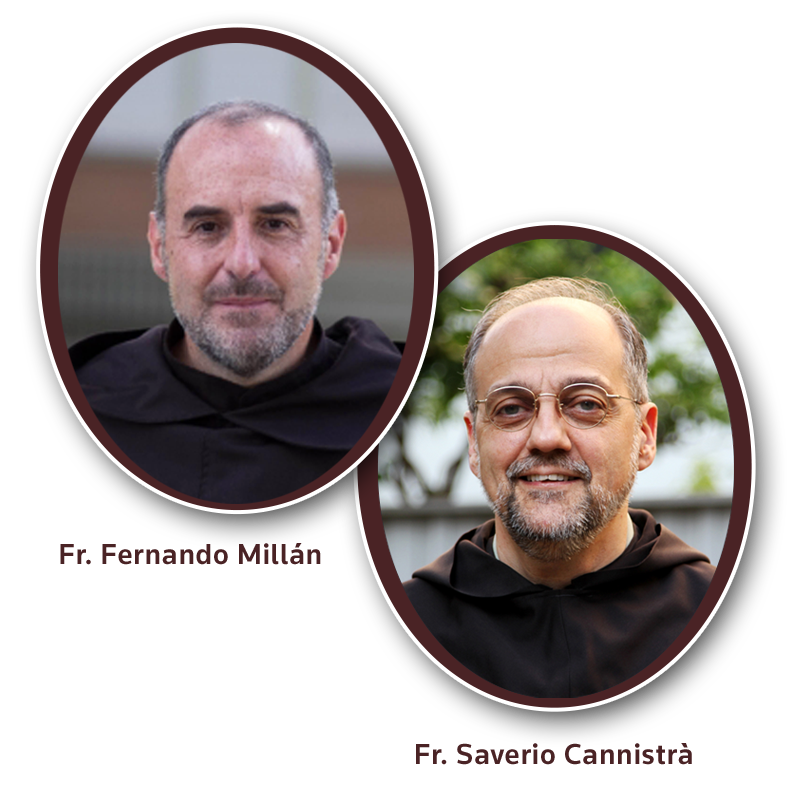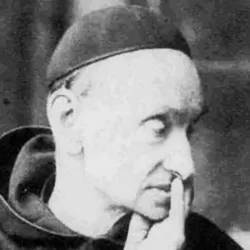“May God be blessed forever,
He who waited for me so long!”

Jubiliee of Mercy
Letter from the O. Carm. Prior General, the Reverend Father Fernando Millán, and the O.C.D. Superior General, the Reverend Father Saverio Cannistrà, on the occasion of the Jubilee of Mercy
To the brothers and sisters of the family of Carmel,
Peace!
On June 11th, accompanied by our respective counselors and definitors general, we crossed the Holy Door together.
From the hand of the Mother of Mercy, beneath the sweet countenance of our Sister and Lady, the Blessed Virgin Mary of Mount Carmel, we have also gone on a pilgrimage, thus symbolizing our commitment and sacrifice with the purpose of reaching the goal that is mercy — our desire to convert ourselves and be merciful as the Father is with us (cf. Misericordiae Vultus — MV- 14).
We entered the Basilica of Saint Peter at the Vatican as if entering a sanctuary of mercy to find ourselves with Mercy made flesh, desirous of intimately participating, like the Virgin Mary, in the mystery of divine love: Jesus Christ (cf. MV 24).
With her, as we crossed the Holy Door, we sang the mercy of the Lord, who, in the life of our family, is tangible in and extends from “generation to generation” (Lk 1,50; cf. MV 24). Called, “pure in heart and stout in conscience... [to] be unswerving in service of [our] Master” (Rule, 2), we fulfill all the more faithfully our vocation to the extent that we understand it, delving into its mystery. Who, better than our Sister and Lady, can help us complete that beautiful task! She who “treasured divine mercy in her heart in perfect harmony with her Son Jesus” (MV 24).
“Jesus Christ is the face of the Father’s mercy” (MV 1); therefore, if we really want to be an efficacious sign of the work of the merciful Trinity in the world (cf. MV 2-3), it is absolutely necessary that we stop to contemplate him, that we grow in the knowledge of Jesus Christ to be able to “experience the love of the Most Holy Trinity” (MV 8). To live the jubilee of mercy, before focusing on works and activities in favor of others, one must first fix one’s gaze on Him who makes the love of God visible and tangible (cf. ib.). Just by looking at him and meditating on his gestures and words we can dispose ourselves to give ourselves freely to others, to carry out in his name signs of mercy and compassion toward all. That is the example our saints gave us, who preceded us on the ascent of the Holy Mountain of Carmel: to know Christ in order to make him known and loved.
In this letter we want to invite you to contemplate Christ with the support of the Blessed Virgin.
In this letter we want to invite you, therefore, to contemplate Christ with the support of the Blessed Virgin, who does not remove her merciful eyes from us, and with the testimony of some of our saints. We want them to help us be converted so that we may be apostles of God, who showers on our Order, on the Church, and on the world the mercy that he has used and desires to continue using with everyone.
Saint Mary Magdalene de Pazzi
With Saint Mary Magdalene de Pazzi — whose 450th anniversary of birth we celebrate this year — we learn to conceive of mercy as a divine attribute, synonymous with peace and reconciliation. God made all things with great order, but also with very great mercy, which proceeds from the great and overflowing Love he has toward his creatures. He lives it throughout his entire dimension, to the point of its not being able to be expressed in words (cf. The Forty Days).
All said, it is in the Incarnation of the Word where divine mercy is definitively manifest. She, whose surname in religion was “of the Incarnate Word,” understands that in the womb of Mary, the Mother of Mercy, God definitively sealed peace with the human race.
For Saint Mary Magdalene, all divine mercy is condensed in Christ, perceivable in each one of his gestures and words. He forgives even the abandonment by his disciples in the Garden of Olives when, asleep, they leave him alone in the midst of his atrocious agony, unable to accompany him even with their prayer.
This supreme expression of mercy toward those who crucified him shows us the point to which the mercy of God can reach.
Bowing his head on the cross (cf. Jn 19:30), Jesus, united to the Father, extended that forgiveness to all humanity, carrying out the supreme act of mercy. “This supreme expression of mercy toward those who crucified him shows us the point to which the mercy of God can reach” (MV 24). But his merciful work does not end there. For Saint Mary Magdalene, the love of Christ continues to make itself known: “After ascending into heaven at the right hand of his Eternal Father, Jesus continues manifesting his mercy day by day, which mercy, from our days until the day of Judgment, he will use with all his creatures and most greatly shows us this virtue by putting up with so many sinners and so many offenses which are done to him” (The Forty Days; cf. Colloquies, 2).
Saint John of the Cross
Saint John of the Cross allows us to deepen into and increase even more our understanding of the personal dimension of divine mercy, which does not consist solely in turning his eyes from our defects. By his mercy, the Father makes us grow, lifts us up, inviting us to do the same with others: “Lord, you return gladly and lovingly to lift up the one who offends you, but I do not turn to raise and honor the one who annoys me” (Sayings of Light and Love, 47).This lifting us up consists of elevating us to the most intimate communion with him, as the Prayer of a Soul Taken with Love, which may justly be called the prayer of mercy, sings: “You will not take from me, my God, what you once gave me in your only Son, Jesus Christ, in whom you gave me all I desire. Hence I rejoice that if I wait for you, you will not delay (ib. 26).
[God] allows us to share in his attributes.
St. John of the Cross
Dwelling within us, he beautifies us with works worthy of himself; he allows us to share in his attributes (cf. Living Flame of Love B, 3,6). This, always by the path of contemplation that leads us to union with God, fathoming the abundant mine of treasures that is Christ (cf. Spiritual Canticle B, 37,4).
For John of the Cross, God wants to be ours, to give himself to us (cf. Living Flame of Love B, 3,6); that is the profound sense of his mercy: “Oh, how worthy of utter admiration and joy! God is taken captive by a hair! The reason this captivity is so estimable is that God wished to stop and gaze at the fluttering of the hair, as the preceding verse asserts. And as we pointed out: For God, to gaze at is to love. If in his infinite mercy he had not gazed at us and loved us first — as St. John declares (1 Jn 4:10, 19) — and descended, the hair of our lowly love would not have taken him prisoner, for this love was not so lofty in its flight as to be able to capture this divine bird of heights. But because he came down to gaze at us and arouse the flight of our love by strengthening and giving it the courage for this..., he himself as a result was captivated by the flight of the hair, that is, he was satisfied and pleased. Such is the meaning of the verses: ‘You gazed at it upon my neck and it captivated you.’ It is indeed credible that a bird of lowly flight can capture the royal eagle of the heights if this eagle descends with the desire of being captured” (Spiritual Canticle B, 31,8).
Saint Thérèse of the Child Jesus
He does not call those who are worthy but those whom He pleases.
St. Thérèse of the Child Jesus
This was understood the same way by Saint Thérèse of the Child Jesus, and became a fact her personal experience: “This is the mystery of my vocation, my whole life [...], the privileges Jesus showered on my soul. He does not call those who are worthy but those whom He pleases or as St. Paul says: ‘God will have mercy on whom he will have mercy, and he will show pity to whom he will show pity. So then there is question not of him who wills nor of him who runs, but of God showing mercy’” (Ms A 2r°).
He is the hen who wants to mercifully gather her young under her wings (cf. Her Last Conversations, June 7, 1). The world does not understand his tenderness; it rejects it. That is why Thérèse throws herself decidedly — against the tide of her times — into the arms of merciful love, to which she offers herself as a victim in order that he would “not hold back the waves of infinite tenderness within” him that he desires to lavish on humanity (cf. Ms A 84r°).
“To me,” she confesses in her autobiography, “[God] has granted His infinite Mercy, and through it I contemplate and adore the other divine perfections! All of these perfections appear to be resplendent with love; even His justice [...]. What a sweet joy it is to think that God is Just, i.e., that He takes into account our weakness, that He is perfectly aware of our fragile nature” (ib. 83v°-84r°).
Thérèse does not speak supported by science or human knowledge. She narrates her own experience! The experience of a Love that humbles itself down to the poorest human heart, that heals it and lifts it without considering its miseries or faults. Love that she will struggle to make known, sitting even at the table of those who have distanced themselves, of the unbelievers (cf. Ms C 6r°), making us understand once again that only the one who experiences the Mercy that Christ is can be merciful like the Father.
Blessed Titus Brandsma
[God] gives himself without measure and only awaits the welcome of the human heart.
That is what Blessed Titus Brandsma shows us. For him, the experience of God is not the privilege of a spiritual elite: all are called to enjoy the communion and intimate union with the merciful God. He gives himself without measure and only awaits the welcome of the human heart, adapting himself to our concrete conditions, without rejecting any part of our nature, even taking on our sin in order to redeem us and exalt us, as he demonstrated in the Incarnation. It is necessary to grow every day in the comprehension of this Mystery to be able to adore him not only in our inner self, but in all that exists, and principally in our neighbor, in whose service we are to place ourselves within concrete realities.
Titus gives us an example with his own life: despite being called to carry out important offices, nothing had a higher priority for him than to pay attention to those who needed help, through dialogue, capacity for reconciliation, and pastoral dedication, understood as the desire to take Christ to those most in need.
His solidarity with the Jewish people when the government of the German occupation of Holland established anti-Semitic measures is founded in his love of mercy and justice. Without fearing the consequences, he placed himself on the side of the despairing ones, wanting to give a voice to those whose voice had been snatched away, and defending at the same time the freedom of the Catholic press in the face of the totalitarian impositions of Naziism.
It ended by leading him also to the concentration camps where he suffered tribulations and humiliations, certainly; but there he continued to be an apostle of compassion and reconciliation, sharing his meager rations with others, encouraging them, hearing confessions — even those of some of his guards!
At the end of his life, imitating merciful Jesus who from the cross forgave his enemies, Titus was the countenance of mercy even for the nurse who finished off his life, as she herself confessed years later in her secret declaration, giving her his rosary before dying.
...we can venture to joyfully cross the Holy Door in this jubilee year.
Sisters and brothers: supported by these — and so many other — witnesses of our family, we can venture to joyfully cross the Holy Door in this jubilee year. Let us enthusiastically follow their steps, let us increase our communion with Christ, let us increase our love of him and confess each day the Love he has for us! Let us make him known and loved! This is the way by which mercy must be lived in the family of Carmel, particularly in a year as special as this one.
Saint Teresa of Jesus
Yes, with our Sister and Mother, Teresa of Jesus, we also want to say: May God be blessed forever, He who waits for us so long! We have learned with her to tell everyone how good and great the Lord is.
When, in the Seventh Dwelling Places, describing the mystery of the total gift of God to the person, her pen stops at the abyss of the ineffable which cannot be described, it is her desire to narrate to everyone the goodness of God that gives her the impulse to make the leap and continue writing.
And she does that to tell us that there is no other way to be truly spiritual than to give joy to the Father and to be slaves to Christ, which we accomplish in the measure with which we give joy to others and become their servants, making patent our love of God and neighbor through acts (cf. Interior Castle, 7, 4)
May it please God that, through the intercession of our Sister, the Blessed Virgin of Mount Carmel, and of her Spouse Saint Joseph, our Father and Lord, the heart of the family of Carmel continues burning with the fire of knowledge and love of Jesus Christ, so that we who comprise it, driven by the Holy Spirit, may be apostles of the merciful Trinity, communicating it to everyone through works and words.
Your brothers:
Fr. Fernando Millán, O.Carm., Prior General
Fr. Saverio Cannistrà, O.C.D, Superior General












